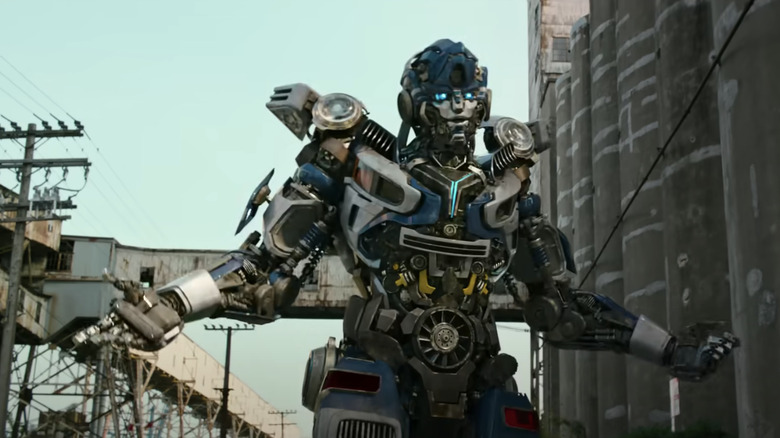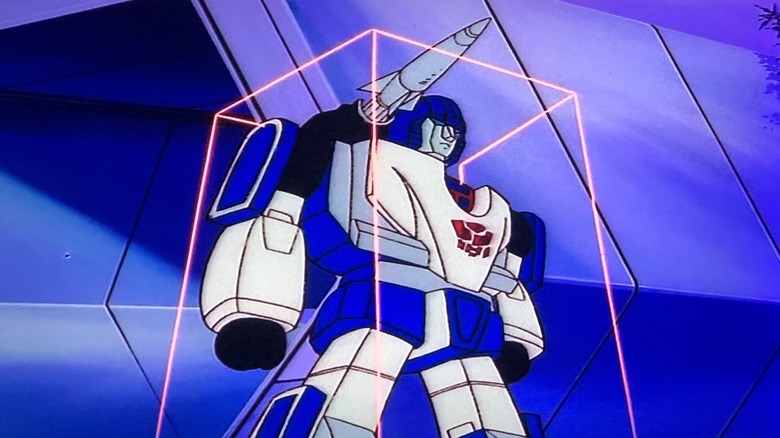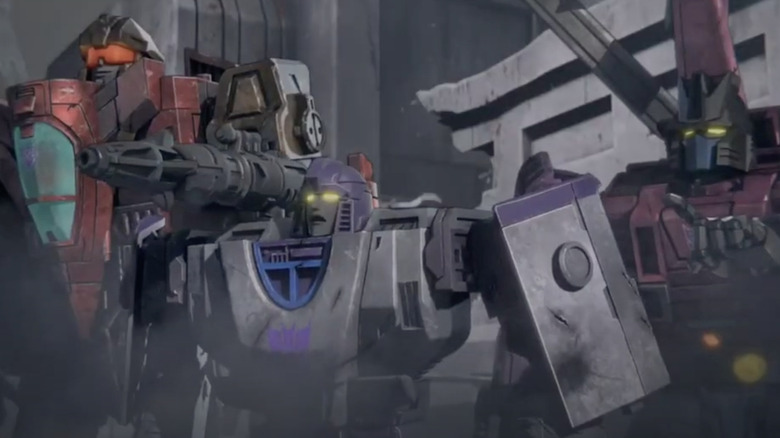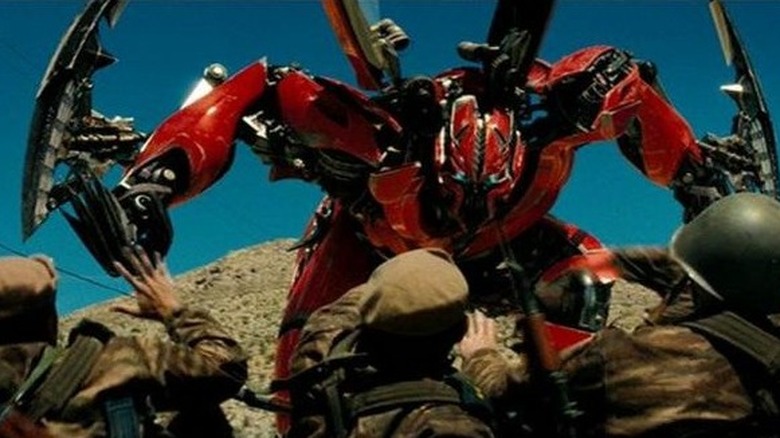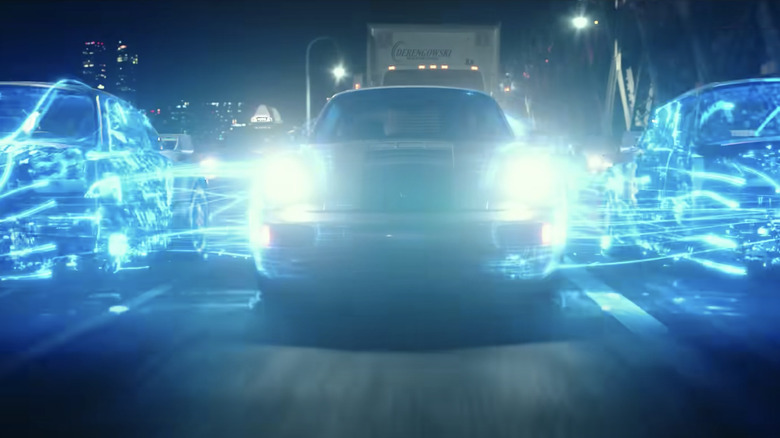Meet Mirage, The Autobot Voiced By Pete Davidson In Transformers: Rise Of The Beasts
The Super Bowl teaser trailer for "Transformers: Rise of the Beasts" served double duty as a Porsche commercial. That's because Mirage, one of the film's new Autobots, transforms into a silver-colored 964-Gen Porsche 911 with a blue racing stripe running down the middle. This car choice is era-appropriate — "Rise of the Beasts" takes place in 1994, the year this Porsche model ceased production after debuting in 1989.
Prominently featured in both trailers so far — they open with the Porsche, in fact — it looks like Mirage will take over Bumblebee's usual role as the Autobot friend of the human lead. In this case, the primary human is called Noah and is played by Anthony Ramos ("In the Heights").
The trailers also indicate how the two meet. Noah stumbles on Mirage chilling in a New York City parking garage. After Noah enters the "car," it begins driving itself. The two are caught in a police chase, where Mirage shows off how he got his name — he creates holographic duplicates of himself to evade his pursuers. The Super Bowl teaser includes footage of Mirage speaking — Pete Davidson ("Saturday Night Live") lends his voice — and sharing a fist bump with Noah.
While this is Mirage's first proper appearance in the live-action film series, he has had a long history. Mirage was part of the original line-up of Autobots who debuted back in 1984. So how does this new version compare to previous ones?
The original Mirage
The toy that would become Mirage was originally part of the Japanese toy line Diaclone, where a blue-and-white robot transformed into a Formula One Ligier JS11 race car. Like its Diaclone contemporaries, the toy was imported to the U.S. by Hasbro and rebranded for use in "The Transformers."
Mirage's original toy bio, or "Tech Spec," described him as the Autobots' spy. He could use an "Electro-disruptor" to create illusions, hence his name. "The Transformers" cartoon — where Mirage was voiced by Frank Welker (Fred Jones and Scooby-Doo in "Scooby-Doo") — simplified this into him being able to turn invisible. That was because his fellow Autobot Hound could also create holograms, so his illusory powers were redundant.
His abilities come into play during the climax of the three-part pilot episode, "More Than Meets The Eye." When the Decepticons blast off in a ship back to Cybertron, an invisible Mirage sneaks aboard to sabotage it, causing it to crash-land. Despite his heroism, the Autobots are half-surprised Mirage didn't just hitch a ride to Cybertron. Mirage's bio describes him as an unenthusiastic Autobot — formerly part of Cybertron's high class, he misses his pre-war life of aristocratic leisure. The bio concludes that "[Mirage is] unsure of the Autobot cause [and] can't be fully trusted." This characterization was woven into the cartoon as well.
Spy or traitor
In the season 2 episode that aired in 1985 and was bluntly titled "Traitor," the paranoid Autobot Cliffjumper accuses Mirage of conspiring with the Decepticons. While scouting, Cliffjumper discovers a Decepticon operation that Mirage had failed to notice while patrolling the same area the day before. Mirage is innocent, but he does later get mind-controlled by the Decepticon Bombshell and puppeteered against his friends. When he's freed, he and Cliffjumper make up.
Since this episode was Mirage's starring role — most characters in the series usually got one — it has defined him since. In the Japanese "Transformers" anime "Car Robots" — dubbed "Robots in Disguise" in the West — Mirage was an aloof blue-and-white Autobot with a race car alternate mode. It had a "Mirage's Betrayal" episode in 2000, where he pretended to defect to fool the Predacons.
In "Transformers: War & Peace," published by the defunct Dreamwave Comics in 2003, he sells out to Shockwave for a chance to get home. A few years later, IDW Publishing began releasing "Transformers: Spotlight" issues, each one focusing on one character. In Mirage's issue unveiled in 2008, he has a vision where he helps the Decepticons win the war.
And then in 2020, Netflix's "War for Cybertron" cartoon has Mirage briefly pose as a Decepticon — a nod to his original spy persona. The jig goes up when the illusion he was using to disguise his Autobot insignia fails.
Dino or Mirage?
Mirage has appeared in the live-action "Transformers" movies before... sort of. The third film "Transformers: Dark of the Moon" featured a red-and-black Autobot who transformed into a Ferrari 458 Italia. In the movie itself, he's referred to as Dino, named after Dino Ferrari.
However, it's believed he was originally meant to be Mirage — the tie-in novelization, comic book, and video game all named him as such. The game even included a nod to "Generation 1" Mirage. In it, all the playable characters have special abilities — Mirage's ability is cloaking, which the player can use to sneak past enemies if they prefer stealth over fighting.
There was no official word from the production, but rumors state that it went back to merchandising, the usual explanation for any decisions made about "Transformers." In 2011, when "Dark of the Moon" came out, Hasbro competitor Mattel had exclusive rights to Ferrari toys. Ergo, Hasbro didn't want one of their trademarked characters to be used in advertising a competitor.
In any case, Dino doesn't have much in common with the classic Mirage. And in an interview with Collider, director Michael Bay also expressed indifference about character names for the Transformers. That lack of interest definitely manifests onscreen.
Rise of the Beasts
On the surface, the Mirage in "Transformers: Rise of the Beasts" looks like a much more faithful rendition of the original character than Dino in "Dark of the Moon." He has a mostly blue-and-white color scheme and his head has the same helmet shape as in "Generation One."
His alternate mode is a bit of a different story though, as they've gone for the aforementioned Porsche rather than an F1 race car. Indeed, some "Transformers" fans have noticed that the car used for the transformed Mirage looks much more like the Autobot Jazz. (We've seen Jazz before, in 2007's "Transformers," where he turned into a Pontiac Solstice.)
Then there's the matter of characterization. From what's been glimpsed so far, Mirage in "Rise of the Beasts" doesn't look like a sneaky spy or a coolheaded old-money type. Rather, he looks like a maverick jokester who defies authority and self-aggrandizes. There's a reason the film cast a comedian like Pete Davidson to be the character's voice.
That said, I'm not concerned about these changes — the whole point of this franchise is transformation, after all. Mirage in "Rise of the Beasts" looks to be a healthy blend of tradition and innovation.
